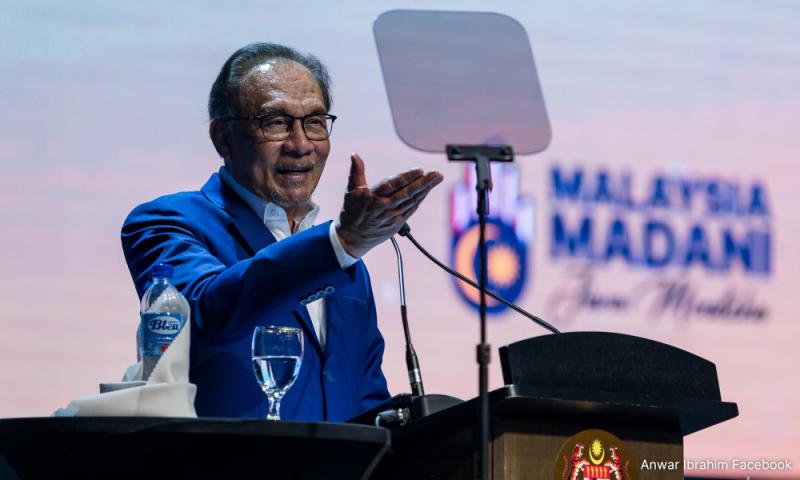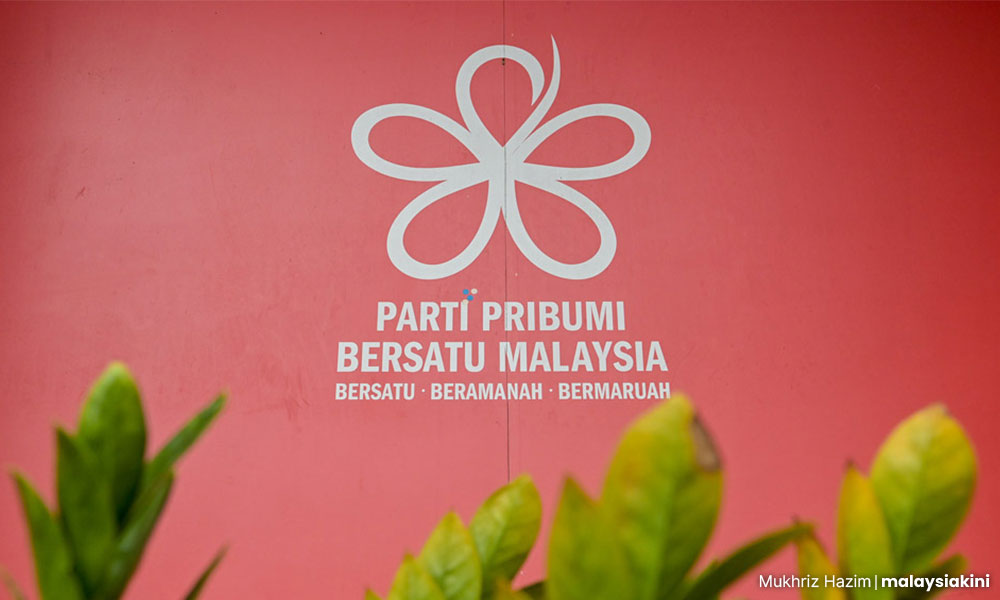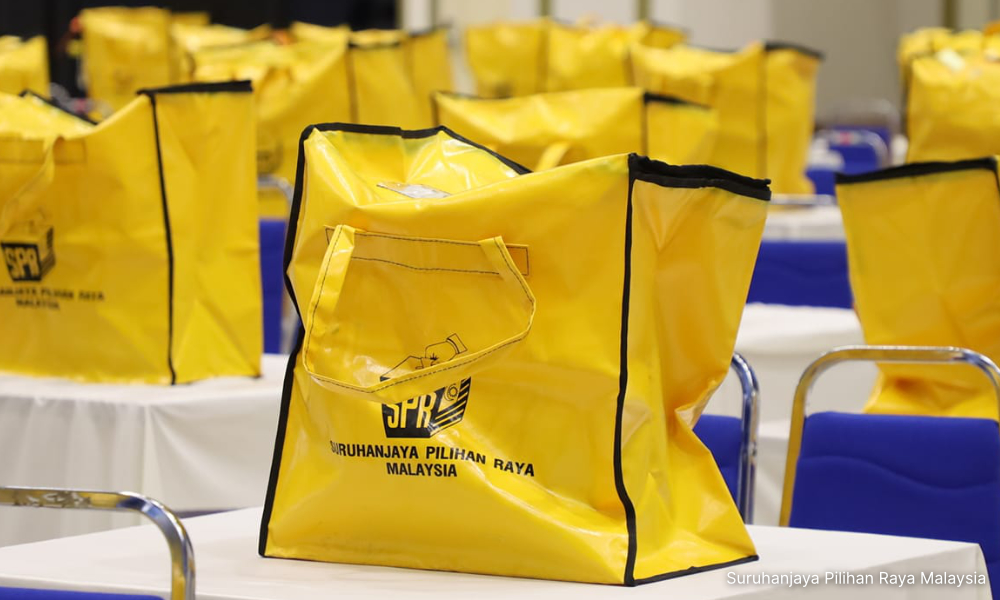


Wong Chin Huat
Published: Jul 26, 2025 10:40 AM
Updated: 12:41 PM
COMMENT | I can understand the frustration many liberal and ethnic-minority Malaysians feel about Prime Minister Anwar Ibrahim.
From Najib Abdul Razak to Ahmad Zahid Hamidi, from the Sabah mining licence scandal to the judicial crisis, from KK Mart to Teoh Beng Hock, they find Anwar more like an old Umno leader than the man who had fought 25 years to end Umno’s hegemony.
Many of these disillusioned voters may not come out to vote in the next general election, or if they do, they may vote for smaller parties or even Perikatan Nasional in protest. Some even hope that the “Turun Anwar” rally this afternoon would start his downfall or at least humble him.
With less than 50 percent vote share in 32 out of 82 seats won by Pakatan Harapan (then included Muda as an informal partner) in 2022, and 20 out of PKR’s 31, a low turnout from Harapan’s liberal-minority base can easily end Anwar’s dream of his second term.
To such discontent, Anwar’s apologists’ standard responses are (a) Anwar inherited a system corrupted in 60 years that cannot be overturned in 2 years; (b) Anwar heads a coalition government which he did not control because he did not win a majority mandate.
Published: Jul 26, 2025 10:40 AM
Updated: 12:41 PM
COMMENT | I can understand the frustration many liberal and ethnic-minority Malaysians feel about Prime Minister Anwar Ibrahim.
From Najib Abdul Razak to Ahmad Zahid Hamidi, from the Sabah mining licence scandal to the judicial crisis, from KK Mart to Teoh Beng Hock, they find Anwar more like an old Umno leader than the man who had fought 25 years to end Umno’s hegemony.
Many of these disillusioned voters may not come out to vote in the next general election, or if they do, they may vote for smaller parties or even Perikatan Nasional in protest. Some even hope that the “Turun Anwar” rally this afternoon would start his downfall or at least humble him.
With less than 50 percent vote share in 32 out of 82 seats won by Pakatan Harapan (then included Muda as an informal partner) in 2022, and 20 out of PKR’s 31, a low turnout from Harapan’s liberal-minority base can easily end Anwar’s dream of his second term.
To such discontent, Anwar’s apologists’ standard responses are (a) Anwar inherited a system corrupted in 60 years that cannot be overturned in 2 years; (b) Anwar heads a coalition government which he did not control because he did not win a majority mandate.

In brief, if Anwar does not do enough, it is because of Umno, the deep state, his other allies or the electorate as a whole.
Let’s try to analyse these three developments using the Anwaritas’ framing.
First, the fabricated charges of drug and fake gun possession against Anwar’s former aide, Yusoff Rawther.
Second, the judiciary crisis. Third, the meteoric rise in the business world of Anwar’s former political secretary, Farhash Wafa Salvador Rizal Mubarak (who also allegedly assaulted Yusoff), obtained a 70,000ha coal prospecting licence in Sabah forest reserves.
Which of these happened because of Umno’s sins in the past six decades? Or because voters did not give Anwar a majority in 2022?
Not who, but how
Anwar’s apologists have another powerful answer: Do you want PAS to run Malaysia?
Do you want Abdul Hadi Awang or Muhyiddin Yassin/Hamzah Zainudin, or Dr Mahathir Mohamad (who would be the world’s first centenarian PM, but he has to first return to Parliament via a by-election) to be your PM?
To this, a friend whose whole families were deeply hurt by Anwar’s reneging on a particular promise, asks: Is Anwar indispensable? If Anwar suddenly leaves this world, would Harapan collapse?
She is not joining the “Turun Anwar” rally because she deems PN as racist. Her point is straightforward - why must we be held ransom by Anwar? Why should we think we have no better choice than Anwar?

(From left) PAS president Abdul Hadi Awang, former prime ministers Dr Mahathir Mohamad and Muhyiddin Yassin
Her question about Anwar’s succession brings an important reminder. The question is not who, but how.
If Anwar suddenly leaves the scene, Harapan and the Madani government would have to quickly find a successor.
It could be from PKR (by seniority, Selangor Menteri Besar Amirudin Shari as the top-voted vice-president, as Deputy President Nurul Izzah Anwar is not an elected MP) or more likely from Umno, Zahid (BN chairperson and, naturally in hierarchy term, deputy prime minister I).
Of course, it could be a major realignment. The two-year-old Madani coalition may just disintegrate as GRS, GPS or even BN may opt to team up with PN to form the new government. That’s what PN has been hoping for. And PMXI could be Muhyiddin 2.0, Hamzah, Hadi or Ahmad Samsuri Mokthar (Terengganu MB).
Putting aside the PM candidate, how can a new government in the next few months be worse than the current one? As pointed out by six NGOs whom Hamzah tried to misrepresent as supporting the “Turun Anwar” rally, institutional reforms may be thrown out of the window amidst political instability.
A mid-term change of government in a parliamentary system means realignment – not replacement - of existing political parties.
If none of the Madani parties or leaders, except the PKR 9, express strong disagreement with Anwar, do you think a new government with most of them would make any difference in judicial independence or prosecutorial independence?
Can a PN/PAS takeover be avoided?
It’s time to unpack the fear of PN/PAS takeover. The fear is built on two premises: first, it can be forever postponed; second, it would not happen partially before GE16, ie, PAS or PN joining the Madani government.
Let’s first deal with the second possibility. It is an open secret in the Madani circle that Anwar is waiting for a post-Hadi PAS to join his government or to be co-opted in some sense.
Her question about Anwar’s succession brings an important reminder. The question is not who, but how.
If Anwar suddenly leaves the scene, Harapan and the Madani government would have to quickly find a successor.
It could be from PKR (by seniority, Selangor Menteri Besar Amirudin Shari as the top-voted vice-president, as Deputy President Nurul Izzah Anwar is not an elected MP) or more likely from Umno, Zahid (BN chairperson and, naturally in hierarchy term, deputy prime minister I).
Of course, it could be a major realignment. The two-year-old Madani coalition may just disintegrate as GRS, GPS or even BN may opt to team up with PN to form the new government. That’s what PN has been hoping for. And PMXI could be Muhyiddin 2.0, Hamzah, Hadi or Ahmad Samsuri Mokthar (Terengganu MB).
Putting aside the PM candidate, how can a new government in the next few months be worse than the current one? As pointed out by six NGOs whom Hamzah tried to misrepresent as supporting the “Turun Anwar” rally, institutional reforms may be thrown out of the window amidst political instability.
A mid-term change of government in a parliamentary system means realignment – not replacement - of existing political parties.
If none of the Madani parties or leaders, except the PKR 9, express strong disagreement with Anwar, do you think a new government with most of them would make any difference in judicial independence or prosecutorial independence?
Can a PN/PAS takeover be avoided?
It’s time to unpack the fear of PN/PAS takeover. The fear is built on two premises: first, it can be forever postponed; second, it would not happen partially before GE16, ie, PAS or PN joining the Madani government.
Let’s first deal with the second possibility. It is an open secret in the Madani circle that Anwar is waiting for a post-Hadi PAS to join his government or to be co-opted in some sense.

Of course, if Bersatu can implode, suffer attrition ala Bersatu 6 or join Madani, it would be great. (That’s why Anwar is not giving equal constituency allocation to opposition MPs despite Harapan’s electoral promise in 2022.)
Either (if not both) PAS or Bersatu strikes some deal with Madani, and Anwar’s second term is secured. He does not have to worry about the exodus of his liberal-minority base. In fact, he can even afford a DAP exit and ignore PKR 9’s playing loyal opposition within Madani.
The first possibility deserves even more serious thinking. The liberal-minority constituency likes to believe they can forever postpone PAS or hardline Islamists coming into power.
Is this possible without Malaysia becoming a soft authoritarian regime? Yes, but only if there is competition between two Malay-led major blocs that are both inclusive.
However, under first-past-the-post (FPTP), as we have seen since 2018, the two blocs would eventually be one multiethnic bloc and the other Malay-Muslim nationalist (Umno-PAS, 2018-2020; PN-BN, 2020-2022; PN, 2022-).
With this binary configuration, the unpopularity of the multiethnic coalition - inevitable over time - would naturally benefit the Malay-Muslim nationalist one. This brings us back to the “if-not-Anwar-do-you-want-PAS” dilemma.
Time to rethink democratic transition
The liberal-minority constituency has been largely thinking about the democratic transition as reversing Malay-Muslim nationalism and social conservatism under Umno.
While this naturally leads to the call for democracy (government by popular mandate), what happens if the majority desires inequalities and state control and elects in a conservative-nationalist government?
This leads to a fundamental test of one’s faith in democracy. At this juncture, many would opt for some form of benevolent autocracy, ala Turkiye’s Mustafa Kemal Ataturk and see such a compromise as pragmatic.
This sentiment is reflected in the distrust of elected politicians and craving for unelected actors - from rulers, judges, professional groups, to civil society actors.
The “anything but PAS” defence for Anwar, that many liberal/minority Malaysians now loathe, is but another manifestation of such “pragmatism”.
Perhaps it is time to rethink about democratic transition. We should not see 2018 and 2022 as hard-won victories to now flex the majoritarian political system’s muscle to keep Umno and PAS out of the government.

Instead, we may need to come to terms that PAS may eventually come into federal power, in one way or another, absent a fundamental shift in social preferences or a change in the electoral system.
Equipped with such real pragmatism, what should liberal/minority Malaysians aim for? Should it not be preventing a monopoly bloc, by way of electoral victory or post-election co-option, that leaves some voters in a truly no-choice situation?
Shouldn’t you buy insurance (mitigating the worst) instead of a lottery (hoping for the best)?
In this light, isn’t implementing key institutional reforms to ensure a level playing field and sustainable competition – separation of public prosecution’s role from attorney-general’s, political finance act with public funding for parties, parliamentary reform, PM’s term limit, equal constituency fund – before GE16 more important than changing the PM before GE16?
WONG CHIN HUAT is a political scientist at Sunway University and a member of Project Stability and Accountability for Malaysia (Projek Sama).

My PAS contacts are euphoric in the aftermath of the Turun Anwar rally.
ReplyDeleteThey are convinced the power of the rally has shaken the Anwar Regime.
"Anwar will be gone within 90 days, maybe even 30 days"